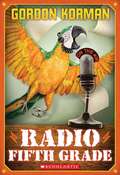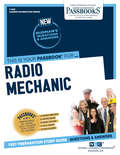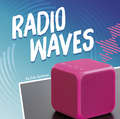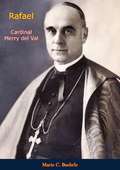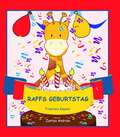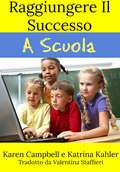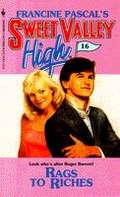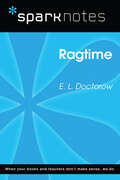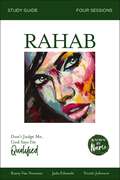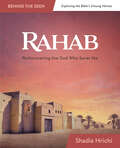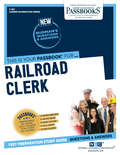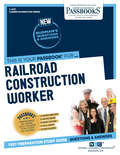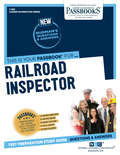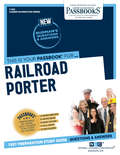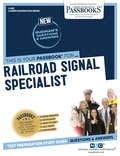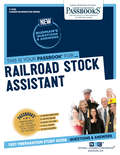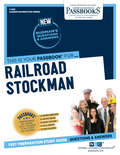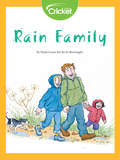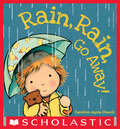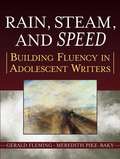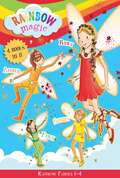- Table View
- List View
Radio Fifth Grade
by Gordon KormanMayhem breaks out in the fifth grade when the Venice Menace bullies his classmates into letting him become a regular guest on "Kidsview," the school's radio program.
Radio Mechanic: Passbooks Study Guide (Career Examination Series #C-660)
by National Learning CorporationThe Radio Mechanic Passbook® prepares you for your test by allowing you to take practice exams in the subjects you need to study. It provides hundreds of questions and answers in the areas that will likely be covered on your upcoming exam, including but not limited to: radio and television repair and diagnostics; diagrams and schematics; fundamentals of electronics; and more.
Radio Waves (Waves in Motion)
by Julia Garstecki-DerkovitzRadio waves aren't just for listening to your favorite radio station! They are used to make GPS receivers and wireless internet work. Scientists use radio telescopes to help them study space. With engaging, at-level text and colorful images, readers learn about radio waves and how we use them every day.
Rafael, Cardinal Merry del Val: Cardinal Merry Del Val
by Marie C. Buehrle"Give me souls, take away all else." This earnest appeal of Cardinal Merry del Val reveals the secret of his life, the story of his ambitions and joys. As man and prelate, few dignitaries of the Church during the early part of this century have left such an impression of culture, holiness, and statesmanship. Irish and Spanish by blood, English by birth and education, cosmopolitan by office, and Catholic in the deepest and truest sense of the word, his ideal was to be a priest in a poor parish in England but he was launched on a diplomatic career opposed to his tastes, his ideals, and his spiritual interests. In the course of his life he became a close friend of two great Popes, Leo XIII and Pius X, with whom he worked on famous reforms and on crucial modern problems. In the early years of his priesthood, Merry del Val organized a club for boys in Trastevere, a rough quarter in Rome, and even when he was Secretary of State under Pius X, he did not miss a day in a visit to this Association.—Print ed.
Raffs Geburtstag (Dschunglies #4)
by Francois Keyser Beatrice Pires-StadlerDie Freunde von Raff, der Giraffe, planen eine Party, aber Raff ist nicht eingeladen. Raff findet das heraus und fühlt sich beleidigt. Warum würden seine Freunde so etwas tun? In diesem Buch der Dschunglis Reihe lernen junge Leser, dass sie immer alle Fakten zuerst sicherstellen sollten, bevor sie Vermutungen anstellen. Jedes der „Dschunglis“ Kinderbücher enthält eine Lehre, die sich junge Leser zu Herzen nehmen sollten. Dies bietet Eltern eine wunderbare Gelegenheit, sie ihren Kindern beim gemeinsamen Lesen zu erklären. Die Bücher bieten auch eine gute Plattform, mit jungen Lesern über „Einheit in Vielfalt“ zu sprechen. Alle Charaktere werden von verschiedenen Tieren dargestellt. Als Freunde arbeiten sie zusammen, um so ihre Herausforderungen zu überwinden und Spaß zu haben. Die Bücher eignen sich auch, um mit Kindern über bedrohte Arten zu sprechen. Jedes Tier wird durch eine Figur mit einer gefährdeten Unterart dargestellt. Die Bücher sind für junge Leser im Alter von 1 bis 7 Jahren gedacht.
Raggiungere Il Successo A Scuola
by Karen Campbell Valentina StaffieriRaggiungere Il Successo A Scuola di Karen Campbell Aiutare il Vostro Bambino In Età Scolare Con La Lettura,L'Ortografia, La Scrittura e La Matematica Lo sapevate che voi come genitori potete effettivamente essere la differenza tra il vostro figlio che ha successo e che fallisce a scuola? Se il vostro bambino ha difficoltà nella scuola elementare o nella scuola primaria, allora potete aiutarlo a cogliere le abilità essenziali di base nella lettura, scrittura, ortografia, matematica e i processi scientifici. Negli ultimi 30 anni Karen Campbell e Katrina Kahler (entrambe insegnanti esperte e consulenti genitoriali) hanno assistito a centinaia di genitori che volevano aiutare il loro bambino, ma solo non sapevo come. Questo ebook vi darà le strategie e le attività che sicuramente fanno la differenza per l'apprendimento e formazione futura del vostro bambino. Questo è il 6° Libro di una serie su come aiutare il vostro bambino, non solo a livello scolastico ma con abilità personali e sociali, l'insegnamento precoce dei neonati, la comunicazione con i vostri figli, l'educazione della pubertà (senza tutte le cose pesanti del sesso che i ragazzini non hanno bisogno di sapere), come fare e mantenere amici, come cambiare il comportamento del vostro bambino oggi e come allevare un bambino sicuro, positivo, forte e concentrato. Tutti questi libri sono uniti in "La Trappola Genitoriale", un must per tutti i genitori. Karen e Katrina sono in una missione per condividere le loro conoscenze ed esperienze con genitori in tutto il mondo. Vogliono mostrarvi come aiutare il vostro bambino a raggiungere il loro pieno potenziale e condurre una vita felice e di successo. Nota sull’Autore: Karen Campbell e Katrina Kahler sono insegnanti premiati (National Inspirational Teaching Award) che hanno insegnato a figli dai 5 ai 13 anni negli ultimi 20 anni. Hanno scritto una serie di libri di facile lettura sulle Abilità Genitoriali. Gli a
Rags to Riches (Sweet Valley High #16)
by Francine Pascal Kate WilliamRoger strikes it rich... No one would have guessed that Roger Barrett, the poorest boy in Sweet Valley, was really one of the Patmans, the wealthiest family in town. But when Roger's mother dies, the secret of his birth is revealed, and overnight he becomes a millionaire!<P>Immediately Jessica Wakefield sets her sights on Roger and his new found wealth. Only one thing stands in her way -- Olivia Davidson, Roger's longtime girlfriend. But not for long. Jessica has a surefire plan to take care of her!
Ragtime (SparkNotes Literature Guide Series)
by SparkNotesRagtime (SparkNotes Literature Guide) by E.L. Doctorow Making the reading experience fun! Created by Harvard students for students everywhere, SparkNotes is a new breed of study guide: smarter, better, faster. Geared to what today's students need to know, SparkNotes provides: *Chapter-by-chapter analysis *Explanations of key themes, motifs, and symbols *A review quiz and essay topicsLively and accessible, these guides are perfect for late-night studying and writing papers
Rahab Bible Study Guide: Don’t Judge Me; God Says I’m Qualified (Known by Name)
by Nicole Johnson Jada Edwards Kasey Van NormanThe women in the Bible asked the same three questions we all still ask today: How does everyone else see me? How do I see myself? How does God see me?The Known By Name Bible study series for women—taught by seasoned Bible teachers Jada Edwards, Kasey Van Norman, and Nicole Johnson—will take you and your group through the lives of biblical women to learn more about God and how to answer these essential questions.Rahab's story, found in the book of Joshua, is a story of a girl boss, an assertive, confident woman who did what she had to do to provide for her family. Her identity was shaped by her upbringing. With no Bible study to join or podcast to download, Rahab learned her beliefs and behaviors in a culture that believed in gods, not God. But when opportunity knocked, she boldly trusted in the God she had never known, and became something she never imagined—a woman who brought freedom to generations.Follow Rahab in this 4-session Bible study (DVD/video streaming sold separately) as she trusts God's final word about her worth above society's words. You will learn how to shed unhelpful labels and fears, and instead revel in God's unconditional love and acceptance of you–just as you are. You can be free from shame and doubt.This study guide features video notes, group discussion questions, and between-session activities like reflecting on the drama and teachings, studying the character story in Scripture, memory verses, and journaling.Sessions include:Your Past Has a PurposeLiking Your ReflectionWhat&’s in a ReputationYou Have a Choice Designed for use with Known By Name: Rahab Video Study (9780310096344), sold separately.
Rahab: Rediscovering the God Who Saves Me
by Shadia HrichiStep into the story of Rahab, a woman who witnessed no miracles and knew none of God’s laws. She merely heard of God’s power—and believed.The story of Rahab appears after God commissions Joshua to lead the Israelites after the death of Moses. No sooner do the people come to the edge of the Promised Land than God puts the whole drama on hold to tell us the story of a Canaanite prostitute. This interruption of the conquest story gives us our first glimpse into the theological significance of Rahab’s story.In the New Testament, Rahab holds a surprisingly prominent position in several key faith passages—as well as being listed in the lineage of Christ! In fact, she marries a prince! The prostitute marries a prince! This is the stuff of movies. The heartbeat of the Bible is God’s passionate pursuit of his adulterous Bride—a theme that echoes within the depths of every human heart.But the best part? Rahab’s story is our story. It’s a story centered on three key themes, without which there would be no Bible, no gospel, and no Savior: faith, grace, and salvation. Through her daring faith, Rahab hid enemy spies, defied her king, risked her life, and found the living God. By the time you finish this six-week study, you will never look at the story of Rahab the same way again.
Railroad Clerk: Passbooks Study Guide (Career Examination Series)
by National Learning CorporationThe Railroad Clerk Passbook® prepares you for your test by allowing you to take practice exams in the subjects you need to study. It provides hundreds of questions and answers in the areas that will likely be covered on your upcoming exam.
Railroad Construction Worker: Passbooks Study Guide (Career Examination Series)
by National Learning CorporationThe Railroad Construction Worker Passbook® prepares you for your test by allowing you to take practice exams in the subjects you need to study. It provides hundreds of questions and answers in the areas that will likely be covered on your upcoming exam.
Railroad Inspector: Passbooks Study Guide (Career Examination Series)
by National Learning CorporationThe Railroad Inspector Passbook® prepares you for your test by allowing you to take practice exams in the subjects you need to study. It provides hundreds of questions and answers in the areas that will likely be covered on your upcoming exam, including but not limited to: principles and practices of construction, operation, maintenance, and inspection of railroad rolling stock (freight cars, passenger cars and locomotives), including safety equipment; interpretation of State and Federal laws, rules, and regulations relating to railroad rolling stock and standards relating to equipment safety appliances; understanding and interpreting diagrams, charts, graphs, and tabular material; preparation of written material; and more.
Railroad Porter: Passbooks Study Guide (Career Examination Series)
by National Learning CorporationThe Railroad Porter Passbook® prepares you for your test by allowing you to take practice exams in the subjects you need to study. It provides hundreds of questions and answers in the areas that will likely be covered on your upcoming exam.
Railroad Signal Specialist: Passbooks Study Guide (Career Examination Series #C-663)
by National Learning CorporationThe Railroad Signal Specialist Passbook® prepares you for your test by allowing you to take practice exams in the subjects you need to study. It provides hundreds of questions and answers in the areas that will likely be covered on your upcoming exam, including but not limited to: ability to supervise a group of technical employees; technical knowledge of the design and installation of railroad signal systems; knowledge of safe working procedures related to signals; and more.
Railroad Stock Assistant: Passbooks Study Guide (Career Examination Series)
by National Learning CorporationThe Railroad Stock Assistant Passbook® prepares you for your test by allowing you to take practice exams in the subjects you need to study. It provides hundreds of questions and answers in the areas that will likely be covered on your upcoming exam.
Railroad Stockman: Passbooks Study Guide (Career Examination Series)
by National Learning CorporationThe Railroad Stockman Passbook® prepares you for your test by allowing you to take practice exams in the subjects you need to study. It provides hundreds of questions and answers in the areas that will likely be covered on your upcoming exam, including but not limited to: receiving, distribution, issuing and storing methods; shipping, loading and unloading; safety in operating equipment and performing work; ability to read and understand operating instructions; processing paperwork and reports; and more.
Railway Samanya Adhyayan
by Sanjet Kumarरेलवे सामान्य अध्ययन (पूर्णतः संशोधित संस्करण) रेलवे भर्ती बोर्ड परिक्षा के हेतु स्पीडी प्रकाशन के द्वारा ये किताब प्रकाशित किया है। रेलवे के विभिन्न पदों के लिए होने वाली परीक्षाओं में 27 वर्षों (1992-2018) में आयोजित रेलवे के लगभग 558 परीक्षाओं के पूछे गए प्रश्नों का विस्तृत व्याख्या सहित हल मुख्य बिन्दु के रूप में प्रस्तुत किया गया है। साथ-ही-साथ भारत के राज्य के अंतर्गत भारत के उन महत्वपूर्ण 29 राज्यों एवं 7 केन्द्र शासित राज्यों का पूर्ण विवरण दिया गया है अति महत्त्वपूर्ण विषय के अंतर्गत क्षेत्रीय सामान्य ज्ञान, राष्ट्रिय प्रतीक एवं चिह्न, पुरस्कार एवं सम्मान, खेल-कूद, विश्व दर्शन, परिवहन, संचार, फिल्म जगत, उद्योग, बैंकिंग, मुद्रा-प्रणाली, बजट एवं वैट, कला एवं संस्कृति, मानव शरीर, भारतीय प्रतिरक्षा, हमारी पृथ्वी, नोबेल पुरस्कार, प्रमुख गवर्नर जनरल एवं वायसराय के अलावा इतिहास, राज्यव्यवस्था, अर्थव्यवस्था, भूगोल, विज्ञान तथा कम्प्यूटर से संबंधित विषयों पर इनके अंतर्गत पूछे जाने वाले प्रश्नों का क्रमानुसार संग्रह दिया गया है।
Rain Family
by Paula LessoWhen it looks like rain, the family in this story dresses for the weather and heads out the door. Discover all the fun they have on a rainy day.
Rain School
by James RumfordIt is the first day of school in Chad, Africa. Children are filling the road. "Will they give us a notebook?" Thomas asks. "Will they give us a pencil?” "Will I learn to read?" But when he and the other children arrive at the schoolyard, they find no classroom, no desks. Just a teacher. "We will build our school," she says. "This is our first lesson. " James Rumford, who lived in Chad as a Peace Corps volunteer, fills these pages with the vibrant colors of Africa and the spare words of a poet to show how important learning is in a country where only a few children are able to go to school.
Rain School
by James RumfordIt is the first day of school in Chad, Africa. Children are filling the road. "Will they give us a notebook?" Thomas asks. "Will they give us a pencil? Will I learn to read?"But when he and the other children arrive at the schoolyard, they find no classroom, no desks. Just a teacher. "We will build our school," she says. "This is our first lesson."James Rumford, who lived in Chad as a Peace Corps volunteer, fills these pages with vibrant ink-and-pastel colors of Africa and the spare words of a poet to show how important learning is in a country where only a few children are able to go to school.
Rain, Rain, Go Away
by Caroline Jayne ChurchThe bestselling author of I Love You Through and Through makes a splash with this popular preschool song!Rain, Rain, Go Away! is already a well-loved preschool favorite. Now this charming ebook will catch everyone’s attention (rain or shine!) as Church’s toddlers and stuffed animals are as adorable as ever in colorful rain gear.A pitch-perfect song for rainy days, sunny days, or any day!
Rain, Steam, and Speed: Building Fluency in Adolescent Writers
by Gerald Fleming Meredith Pike-BakyThis book is a comprehensive framework of instructional protocols intended to expand and deepen students' written fluency. It is a year-long curriculum that builds students' self-confidence, self-awareness, and knowledge of the world. It increases the students' abilities to write easily and articulately on personal and abstract topics. This journal-writing program can easily be integrated into a broader writing framework. The book includes a detailed discography of recommended and easily accessed CDs. <P><P> The prompts are organized thematically and feature issues that range from imaginative to serious, reflecting the preoccupations of young people today. Support for teachers in implementing the program is abundant and includes grading and assessment guidance. Word-for-word teacher instructions as well as explanations of rationale for each component of the program make this book both easy to follow and entertaining to read.
Rainbow English Compulsory Book 1 class 12 - RBSE Board
by Madhyamik Shiksha Board Rajasthan AjmerThe book consists of three distinct sections one each for prose, poetry and writing skills. Major literary forms like prose, poetry, drama, fiction and non-fiction have been suitably used in the book to focus on various themes and issues. The texts of prose and poetry sections have been chosen from popular works of renowned foreign and Indian writers of English presenting themes and issues of wider variety and social milieus to enable our learner to develop deeper insight into them. Each lesson deals with a new theme or issue and provides the student greater exposure to acquaint him/her with that theme or issue. These mainly deal with effective reading, human psychology, socio-cultural and national ethos, conservation of environment and water, India's gifts of Yoga, Purity, Meditation and Concentration, Mahatma Gandhi's first success with Civil Disobedience, physical impairment and sense of alienation, adventure, global warming, joy of freedom, and the power of hope.
Rainbow Fairies: Ruby the Red Fairy, Amber the Orange Fairy, Sunny the Yellow Fairy, Fern the Green Fairy (Rainbow Magic #1)
by Daisy MeadowsWith a flutter of wings, get ready for adventures with magical fairy friends! This colorful collection features the best-selling first four books in the redesigned Rainbow Magic series!One day, best friends Kirsty and Rachel discover a magical surprise when they find a fairy at the end of a rainbow! This sets them off on an adventure to Fairyland where they meet magical fairy sisters and help them with troubles that arise in their beautiful kingdom. This chapter book collection includes the first four titles in the best-selling Rainbow Magic series: Ruby the Red Fairy, Amber the Orange Fairy, Sunny the Yellow Fairy, and Fern the Green Fairy. With age-appropriate text, magical stories, and illustrations throughout, this collection is perfect for kids who are starting to read independently. These beloved stories are sure to inspire a life-long love of reading.Get to know the Rainbow Magic series! With more than 40 million titles of the Rainbow Magic series sold worldwide, this beloved children&’s series is back with a fresh new look and ready for a new audience. Experience the friendship and adventures in Fairyland with these fantastic, introductory illustrated chapter books. This wonderfully engaging series features highly accessible stories, simple language, and black-and-white illustrations, perfect for newly independent readers. A fan favorite for decades, the series has thousands of positive reviews attesting to the fact that the Rainbow Magic series turned their child into a confident and dedicated reader.
